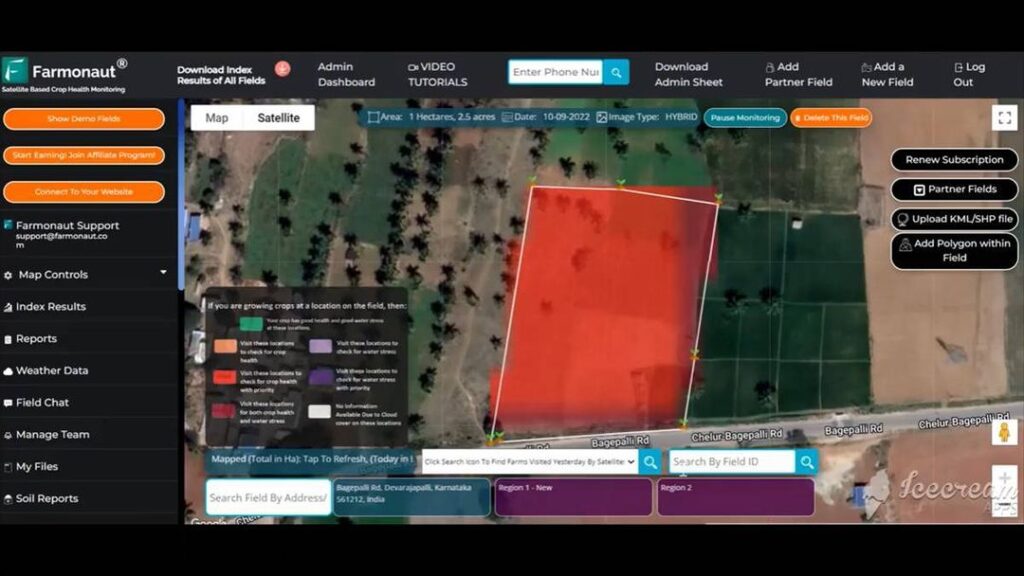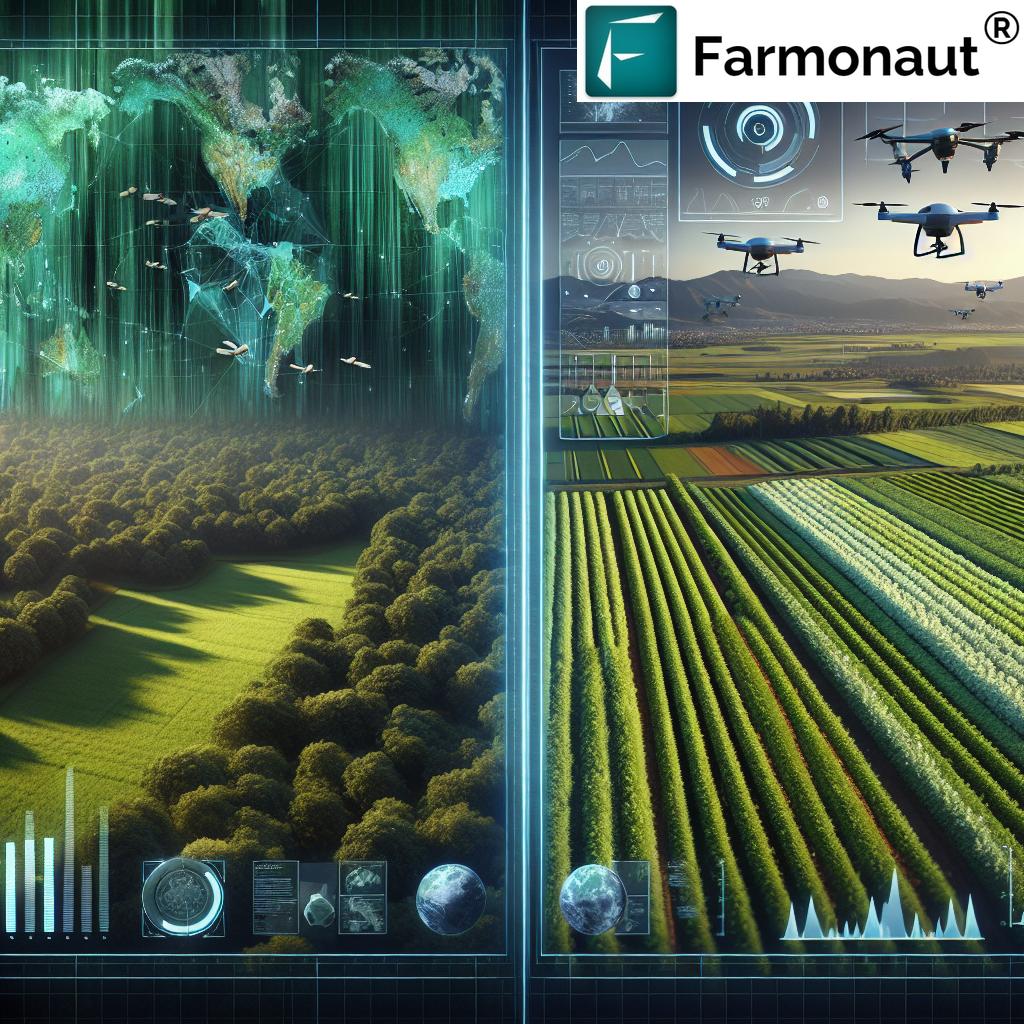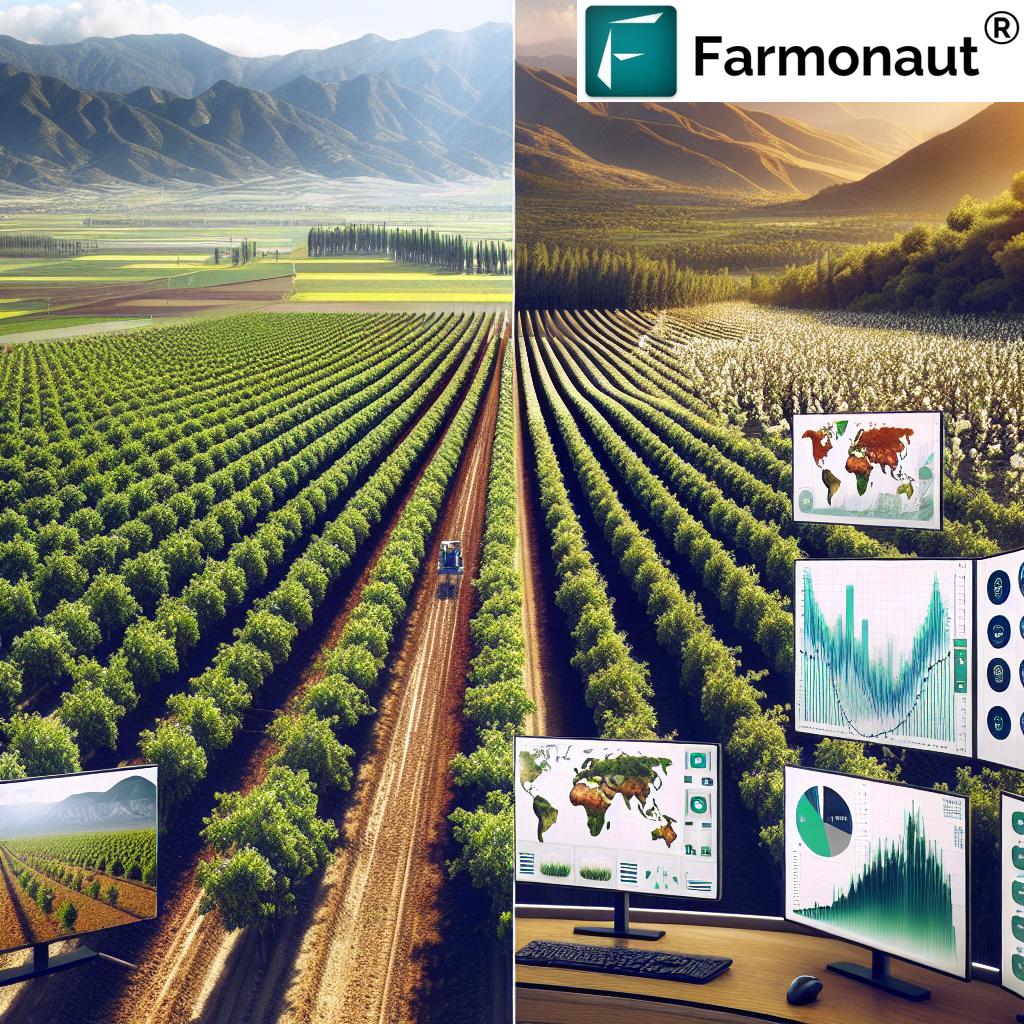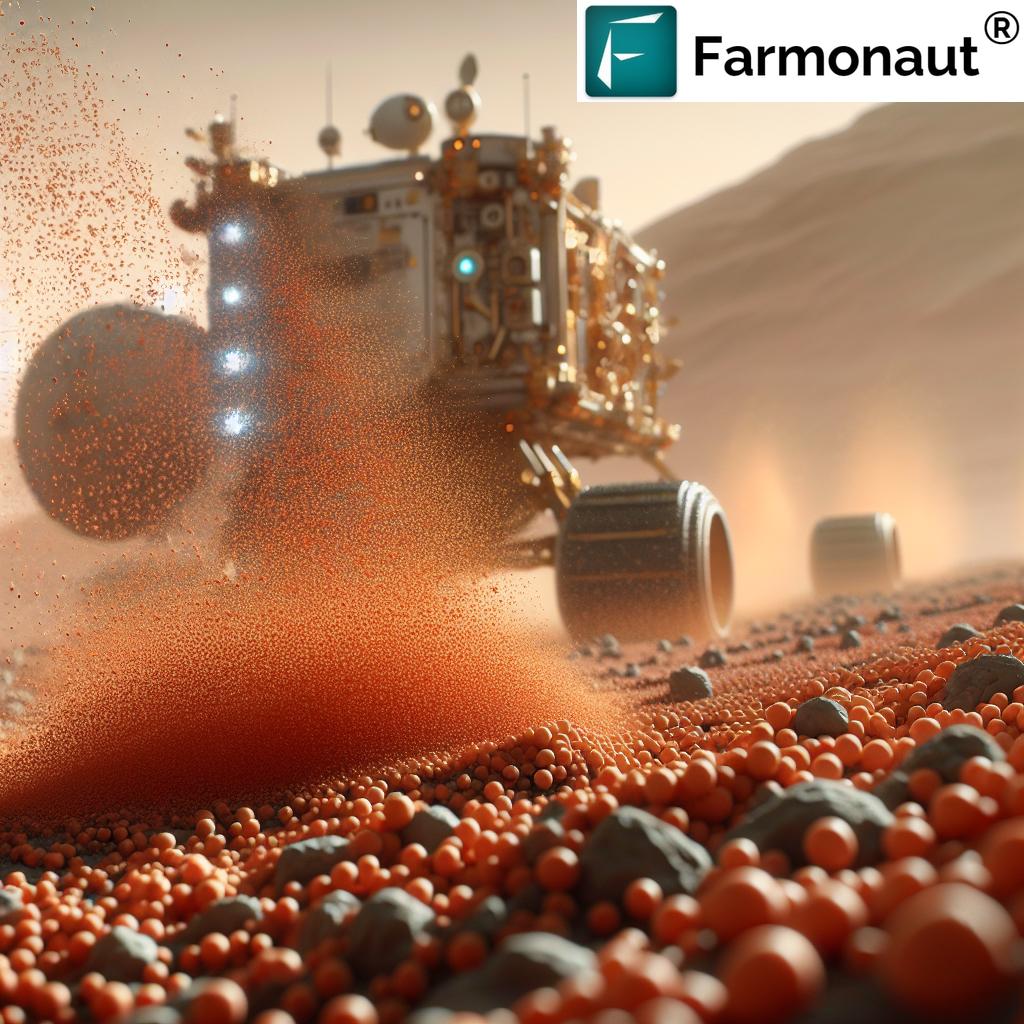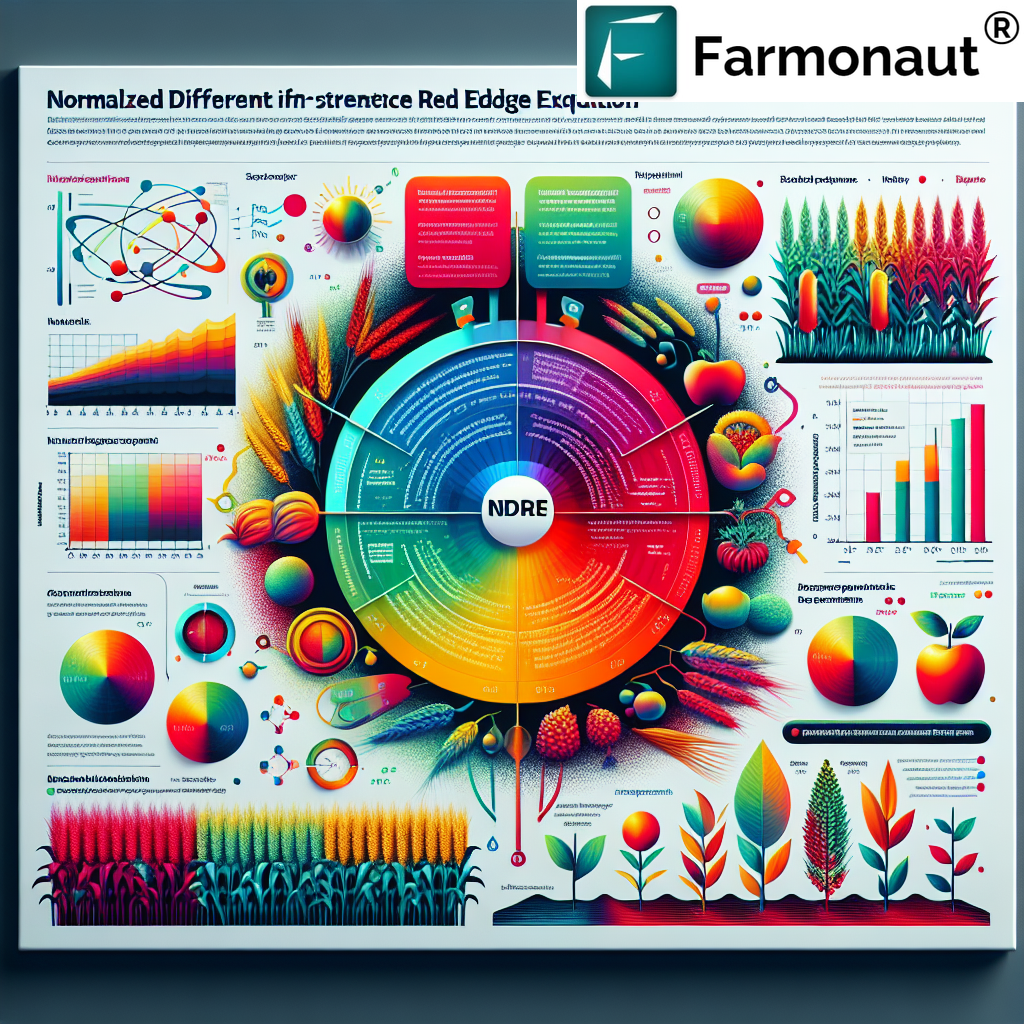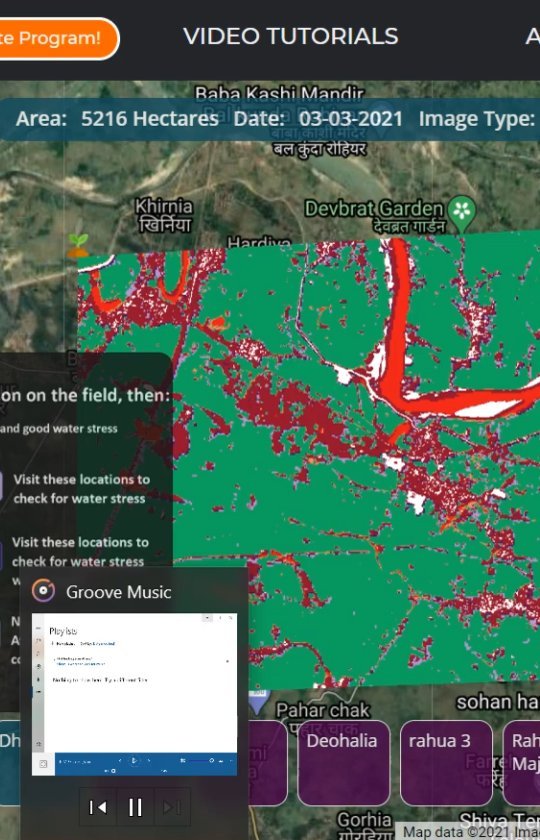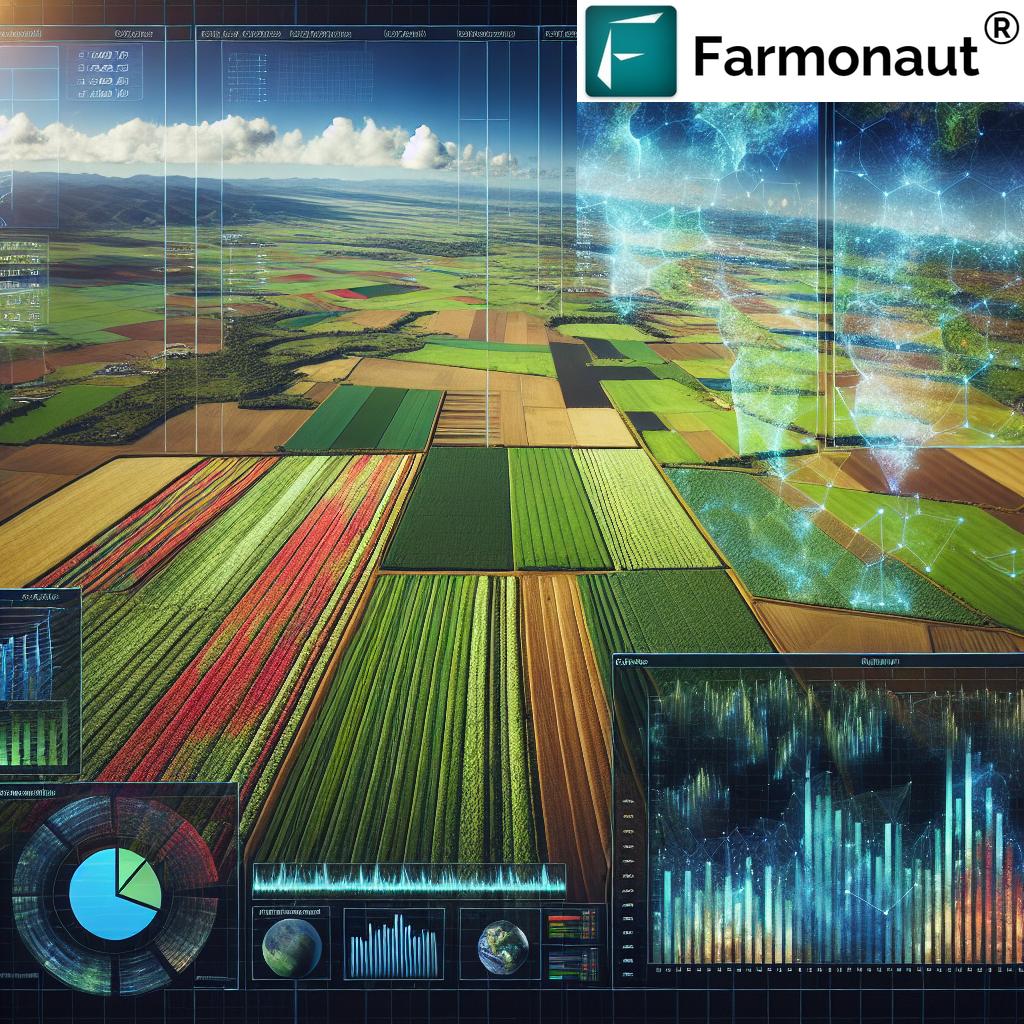
Revolutionizing Agriculture: Harnessing the Power of Soil Organic Carbon with Farmonaut
In the ever-evolving landscape of modern agriculture, we at Farmonaut are leading the charge in innovative farming solutions. Our latest breakthrough? Empowering farmers and carbon management experts with crucial Soil Organic Carbon (SOC) imagery through our cutting-edge web platform. This advancement is not just a step forward; it’s a giant leap toward informed decision-making in agriculture and sustainable farming practices.
Understanding Soil Organic Carbon (SOC)
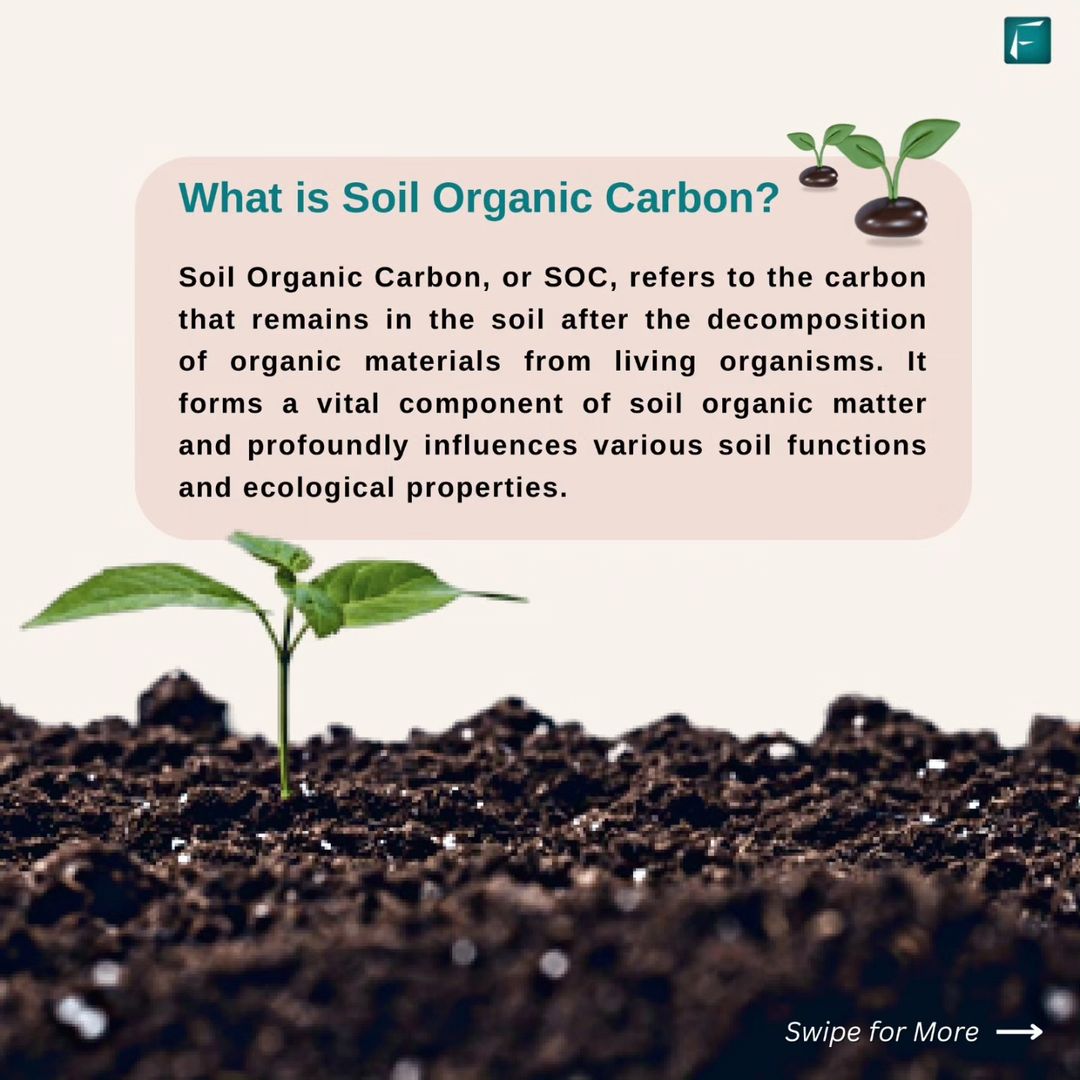
Before we delve into the revolutionary aspects of our technology, let’s take a moment to understand what Soil Organic Carbon (SOC) is and why it’s so crucial for agriculture and our planet.
Soil Organic Carbon (SOC) refers to the carbon component of organic compounds in soil. It’s a key element of soil organic matter and plays a vital role in the carbon cycle. SOC is derived from living organisms, including plants and animals, that decompose and become part of the soil structure.
The Importance of Soil Organic Carbon
SOC is not just another soil component; it’s a cornerstone of soil health and, by extension, agricultural productivity and environmental sustainability. Here are five key reasons why SOC is of paramount importance:
- Soil Fertility: SOC improves soil structure, enhancing its ability to retain nutrients and water. This leads to increased soil fertility and better crop yields.
- Water Retention: Soils rich in organic carbon can hold more water, reducing the need for irrigation and making crops more resilient to drought conditions.
- Carbon Sequestration: SOC plays a crucial role in carbon sequestration, helping to mitigate climate change by removing carbon dioxide from the atmosphere and storing it in the soil.
- Biodiversity Support: Higher levels of SOC support a diverse range of soil microorganisms, which are essential for nutrient cycling and plant health.
- Erosion Prevention: SOC improves soil structure, making it more resistant to erosion by wind and water.
The Role of Carbon in Soil
Carbon in soil is not just about numbers; it’s about life itself. Organic carbon in soil serves as the backbone of soil fertility and health. It’s the fuel that powers the soil ecosystem, supporting a vast network of microorganisms that, in turn, support plant growth.
When we talk about carbon sequestration in agriculture, we’re referring to the process of capturing atmospheric carbon dioxide and storing it in the soil. This process not only helps mitigate climate change but also improves soil quality and agricultural productivity.
Farmonaut’s Innovative Approach to SOC Management
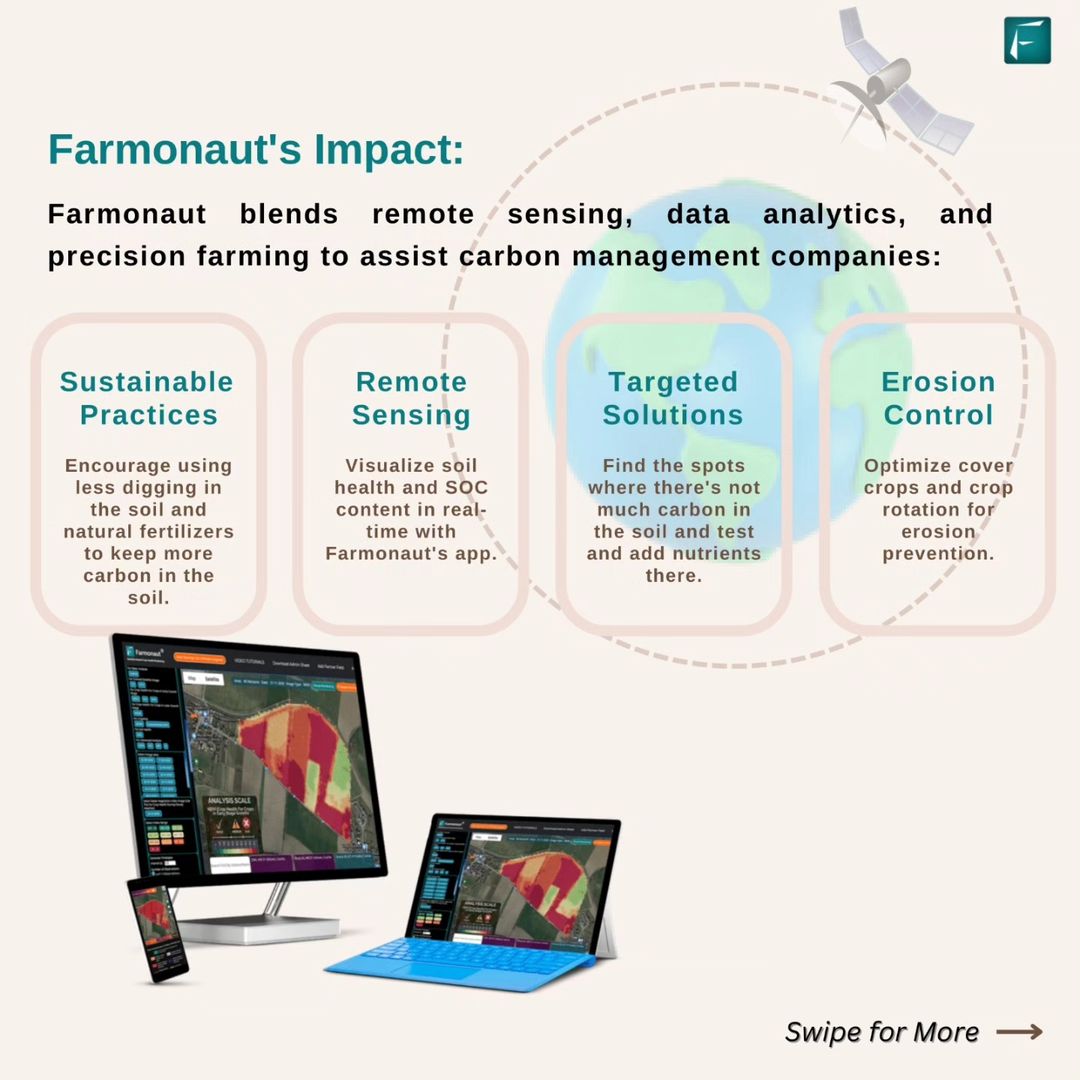
At Farmonaut, we’ve harnessed the power of cutting-edge technology to revolutionize SOC management. Our approach combines remote sensing, data analytics, and precision farming techniques to provide farmers and carbon management companies with unparalleled insights into soil health.
Key Features of Farmonaut’s SOC Management System:
- Real-time Visualization: Our platform provides real-time visualization of soil health and SOC content, allowing farmers to make informed decisions quickly.
- Targeted Solutions: We help identify areas with low carbon content, enabling targeted interventions and nutrient management.
- Sustainable Practices Promotion: Our system encourages practices that minimize soil disturbance and promote the use of organic fertilizers, helping to maintain and increase SOC levels.
- Erosion Control Optimization: We provide data-driven recommendations for cover crops and crop rotation to prevent soil erosion effectively.
The Farmonaut Advantage: Satellite vs. Drone and IoT
While drone and IoT-based farm monitoring systems have their merits, Farmonaut’s satellite-based system offers distinct advantages. Here’s a comparison:
| Feature | Farmonaut Satellite System | Drone-based Systems | IoT-based Systems |
|---|---|---|---|
| Coverage Area | Vast areas (Global) | Limited by flight time and regulations | Limited by sensor placement |
| Data Collection Frequency | Regular and consistent | Dependent on flight schedules | Continuous but localized |
| Cost-effectiveness | High (no on-site equipment needed) | Medium (requires drone purchase and operation) | Low to Medium (depends on number of sensors) |
| Data Processing | Advanced AI and machine learning | Requires specialized software | Real-time but limited in scope |
| Ease of Use | User-friendly web and mobile apps | Requires trained operators | Simple but may require technical setup |
Visualizing SOC Content: A Game-Changer for Agriculture
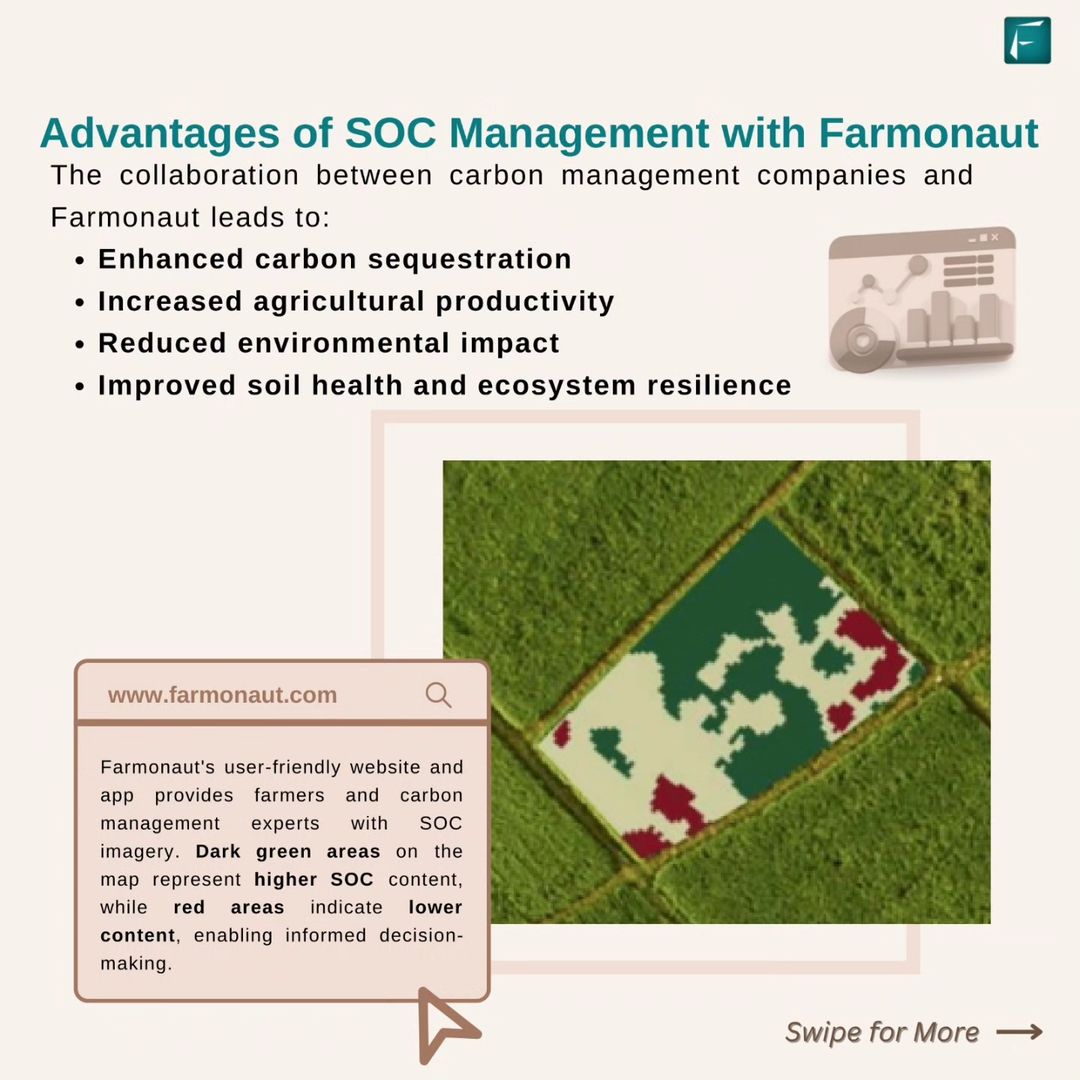
Our innovative platform doesn’t just collect data; it transforms it into actionable insights. Through our user-friendly website and mobile app, farmers and carbon management experts can access detailed SOC imagery that paints a clear picture of soil health across their fields.
On our maps, dark green areas represent higher SOC content, while red areas indicate lower content. This visual representation allows for quick identification of areas that need attention, enabling targeted interventions and more efficient resource allocation.
The Impact of SOC Visualization:
- Enhanced Carbon Sequestration: By identifying areas with high SOC potential, farmers can implement practices that maximize carbon storage in the soil.
- Increased Agricultural Productivity: Understanding SOC distribution helps in optimizing crop placement and management practices, leading to improved yields.
- Reduced Environmental Impact: Targeted interventions based on SOC data minimize the need for excessive fertilizer use, reducing runoff and environmental pollution.
- Improved Soil Health and Ecosystem Resilience: By maintaining optimal SOC levels, soil structure and biodiversity are enhanced, creating more resilient agricultural ecosystems.
Farmonaut: Driving Innovation for a Greener Future
At Farmonaut, we’re not just providing a service; we’re pioneering a movement toward more sustainable and efficient agriculture. Our platform is a testament to the power of technology in addressing some of the most pressing challenges in modern farming.
Key Benefits of Farmonaut’s Platform:
- Data-Driven Decision Making: Our platform provides farmers with the data they need to make informed decisions about crop management, resource allocation, and sustainability practices.
- Cost-Effective Precision Agriculture: By leveraging satellite technology, we make precision agriculture accessible to farmers of all scales, without the need for expensive on-site equipment.
- Environmental Stewardship: Our tools enable farmers to actively participate in carbon sequestration efforts, contributing to global climate change mitigation.
- Increased Farm Profitability: By optimizing resource use and improving crop yields, our platform helps farmers increase their profitability while practicing sustainable agriculture.
- Scalable Solutions: Whether you’re managing a small family farm or overseeing large agricultural operations, our platform scales to meet your needs.
Join the Farmonaut Community
Are you ready to revolutionize your farming practices and contribute to a more sustainable future? Join the Farmonaut community today!
- Download our mobile app:
Android |
iOS - Access our web platform: Farmonaut Web App
- Explore our API for developers: API Documentation
Subscribe to Farmonaut
Frequently Asked Questions (FAQ)
Q: What is Soil Organic Carbon (SOC)?
A: Soil Organic Carbon (SOC) refers to the carbon component of organic compounds in soil. It’s derived from living organisms and plays a crucial role in soil health, fertility, and carbon sequestration.
Q: How does Farmonaut measure SOC?
A: Farmonaut uses advanced satellite imagery and spectral analysis to estimate SOC levels across agricultural lands. Our AI algorithms process this data to provide accurate SOC content maps.
Q: Can Farmonaut’s platform help in carbon credit programs?
A: Yes, our platform can be instrumental in carbon credit programs by providing accurate data on SOC levels and changes over time, which is crucial for verifying carbon sequestration efforts.
Q: How often is the SOC data updated?
A: The frequency of updates depends on satellite pass-overs and cloud cover. Generally, we provide updates every 5-7 days, but this can vary based on specific locations and weather conditions.
Q: Is Farmonaut’s platform suitable for small-scale farmers?
A: Absolutely! Our platform is designed to be scalable and accessible to farmers of all sizes, from small family farms to large agricultural enterprises.
Q: How does improving SOC benefit farmers economically?
A: Higher SOC levels lead to improved soil fertility, water retention, and overall soil health. This results in better crop yields, reduced input costs (like fertilizers and irrigation), and potentially higher-quality produce, all contributing to improved farm economics.
Q: Can Farmonaut’s platform integrate with other farm management tools?
A: Yes, we offer API access that allows integration with various farm management systems. For more information, please check our API documentation.
Q: How accurate is Farmonaut’s SOC measurement compared to traditional soil testing?
A: While traditional soil testing provides highly accurate point-specific data, our satellite-based system offers a comprehensive view of entire fields with good accuracy. It’s an excellent tool for identifying trends and areas that need attention, which can then be verified with targeted soil testing if needed.
Q: Does Farmonaut provide recommendations for improving SOC levels?
A: Yes, our platform includes an AI-driven advisory system that provides personalized recommendations for improving SOC levels based on your specific field conditions and historical data.
Q: How does Farmonaut contribute to sustainable agriculture?
A: By providing detailed insights into SOC levels and soil health, Farmonaut enables farmers to make informed decisions that promote sustainable practices. This includes optimizing resource use, reducing chemical inputs, and implementing practices that enhance carbon sequestration.
Conclusion: Empowering Sustainable Agriculture with Farmonaut
As we face the challenges of climate change and the need for sustainable food production, tools like Farmonaut’s SOC management platform become increasingly crucial. By providing farmers and carbon management experts with detailed, actionable insights into soil health, we’re not just improving agricultural productivity – we’re contributing to a more sustainable and resilient future for our planet.
Join us in this agricultural revolution. With Farmonaut, you’re not just farming; you’re nurturing the earth, sequestering carbon, and playing a vital role in combating climate change. Together, we can create a greener, more sustainable future for generations to come.

Ready to transform your farming practices? Sign up for Farmonaut today and be part of the sustainable agriculture revolution!


